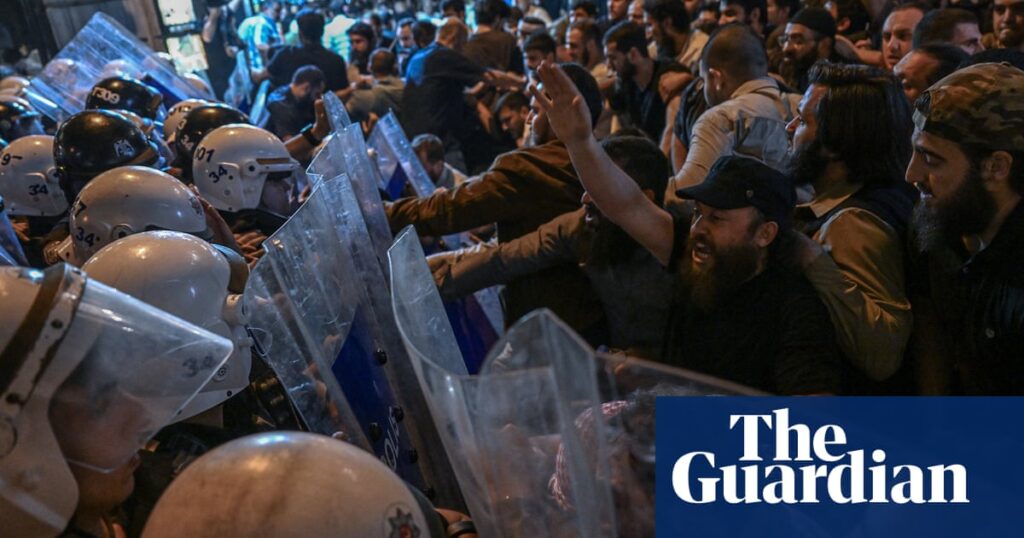
Clashes erupted in Istanbul on Monday as police deployed rubber bullets and teargas to disperse a crowd protesting a satirical magazine’s alleged depiction of the prophet Muhammad. The unrest followed orders from Istanbul’s chief prosecutor to arrest editors at LeMan magazine, accused of publishing a cartoon that “publicly insulted religious values.”
The magazine’s editor-in-chief, Tuncay Akgun, refuted the allegations, stating that the image had been misinterpreted. “This cartoon is not a caricature of prophet Muhammad in any way,” Akgun told Agence France-Presse. “In this work, the name of a Muslim who was killed in the bombardments of Israel is fictionalized as Muhammad. More than 200 million people in the Islamic world are named Muhammad. [It] has nothing to do with prophet Muhammad. We would never take such a risk.”
Protests and Arrests
As news of the arrest orders spread, several dozen protesters attacked a bar frequented by LeMan staffers in downtown Istanbul, leading to confrontations with police. An AFP correspondent reported that the scuffles quickly escalated, involving between 250 to 300 people.
Founded in 1991, LeMan is renowned for its political satire and has often clashed with conservative factions, particularly after supporting France’s Charlie Hebdo following the 2015 attack by Islamist gunmen. The attack was in response to Charlie Hebdo’s publication of caricatures of the prophet Muhammad.
Interior Minister Ali Yerlikaya announced on social media platform X that police had arrested the cartoonist responsible for the image and LeMan’s graphic designer. “The person named DP who made this vile drawing has been caught and taken into custody,” he wrote, adding, “These shameless individuals will be held accountable before the law.”
Magazine’s Defense and Official Reactions
In a series of posts on X, LeMan defended the cartoon, asserting it had been deliberately misinterpreted to incite provocation. “The cartoonist wanted to portray the righteousness of the oppressed Muslim people by depicting a Muslim killed by Israel, he never intended to belittle religious values,” the magazine stated. “We do not accept the stigma imposed on us because there is no depiction of our prophet. It takes a very malicious person to interpret the cartoon in this way.”
Justice Minister Yilmaz Tunc announced an investigation on grounds of “publicly insulting religious values.” He stated, “Disrespect towards our beliefs is never acceptable. No freedom grants the right to make the sacred values of a belief the subject of ugly humour. The caricature or any form of visual representation of our prophet not only harms our religious values but also damages societal peace.”
Istanbul’s governor, Davut Gul, also condemned “this mentality that seeks to provoke society by attacking our sacred values.” He affirmed, “We will not remain silent in the face of any vile act targeting our nation’s faith.”
Historical Context and Implications
This incident is reminiscent of past controversies surrounding depictions of the prophet Muhammad, which have often sparked significant backlash in the Islamic world. The 2015 Charlie Hebdo attack in Paris remains a poignant example, highlighting the tensions between freedom of expression and religious sensitivities.
Experts note that such incidents can exacerbate societal divisions and lead to broader debates about the limits of satire and freedom of speech. “These situations often become flashpoints for larger discussions about cultural respect and the boundaries of artistic expression,” said Dr. Elif Kaya, a sociologist specializing in media and religion.
“The balance between respecting religious sentiments and upholding free speech is delicate, and each incident like this tests that equilibrium,” Dr. Kaya added.
Looking Ahead
The fallout from the LeMan controversy is likely to continue, as legal proceedings unfold and public discourse intensifies. The incident underscores ongoing challenges in navigating the intersection of media, religion, and law in a culturally diverse society.
As the investigation progresses, both supporters and critics of LeMan will be watching closely, with potential implications for media freedoms and religious tolerance in Turkey. The situation serves as a reminder of the potent impact of media representations and the complex dynamics they can unleash.





